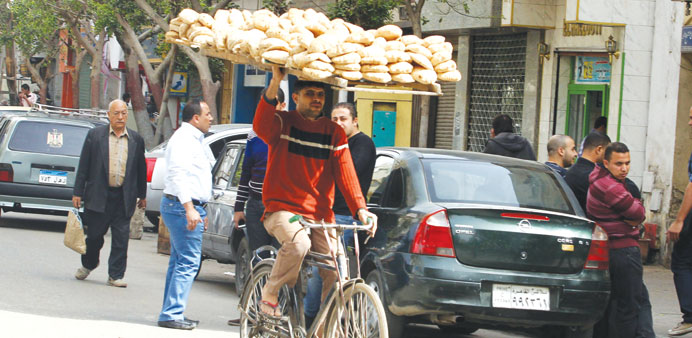An Egyptian man carries a wood rack full of bread on his head on a bike to be distributed to customers in Cairo. Prices of food and drink - which swallows up much of poor Egyptians’ incomes - rose 9.3% year-on-year last month.
Reuters/Cairo
Egypt yesterday rejected any suggestion of stop-gap IMF funding to help it through a political and economic crisis, saying only broad structural measures as part of a package agreed with the Fund can tackle the country’s soaring budget deficit.
With President Mohamed Mursi struggling to contain violent protests, new figures released yesterday showed a jump in inflation, which will hurt the poor hardest and is likely to stir yet more social unrest.
Cairo wants to reopen talks with the International Monetary Fund on a $4.8bn loan which it put on hold during rioting last December. The IMF has yet to respond publicly to the invitation and analysts say it seems reluctant to negotiate on a full deal during the current political chaos.
Planning Minister Ashraf al-Araby said only a comprehensive programme would do. “The cure for the budget deficit needs broad structural measures and the help we are requesting from the IMF is not quick fixes,” he told a news conference.
Cairo’s problems are daunting. Foreign currency reserves have fallen to little more than a third of their levels before the 2011 revolution, forcing the central bank to ration dollars.
Egypt’s statistics agency CAPMAS highlighted yesterday an unwelcome consequence of the weak currency: a leap in inflation. Illustrating the squeeze on living standards since the fall of Hosni Mubarak, prices in towns and cities rose 8.2% in the year to February, sharply higher than the 6.3% inflation rate the previous month.
Economists blamed the turmoil on Egypt’s streets and in politics which has undermined economic confidence and pushed the pound lower, increasing the cost of imported food.
EFG-Hermes economist Mohamed Abu Basha said inflation may accelerate yet further. “It could rise more given the ongoing unrest and huge losses in the value of the Egyptian pound of around 10% ... since the start of the year,” he told Reuters.
February’s month-on-month inflation rate also leapt to 2.5% from 1.7 the previous month, the CAPMAS statistics agency reported.
Prices of food and drink - which swallow up much of poor
Egyptians’ incomes - rose 9.3% year-on-year last month.

